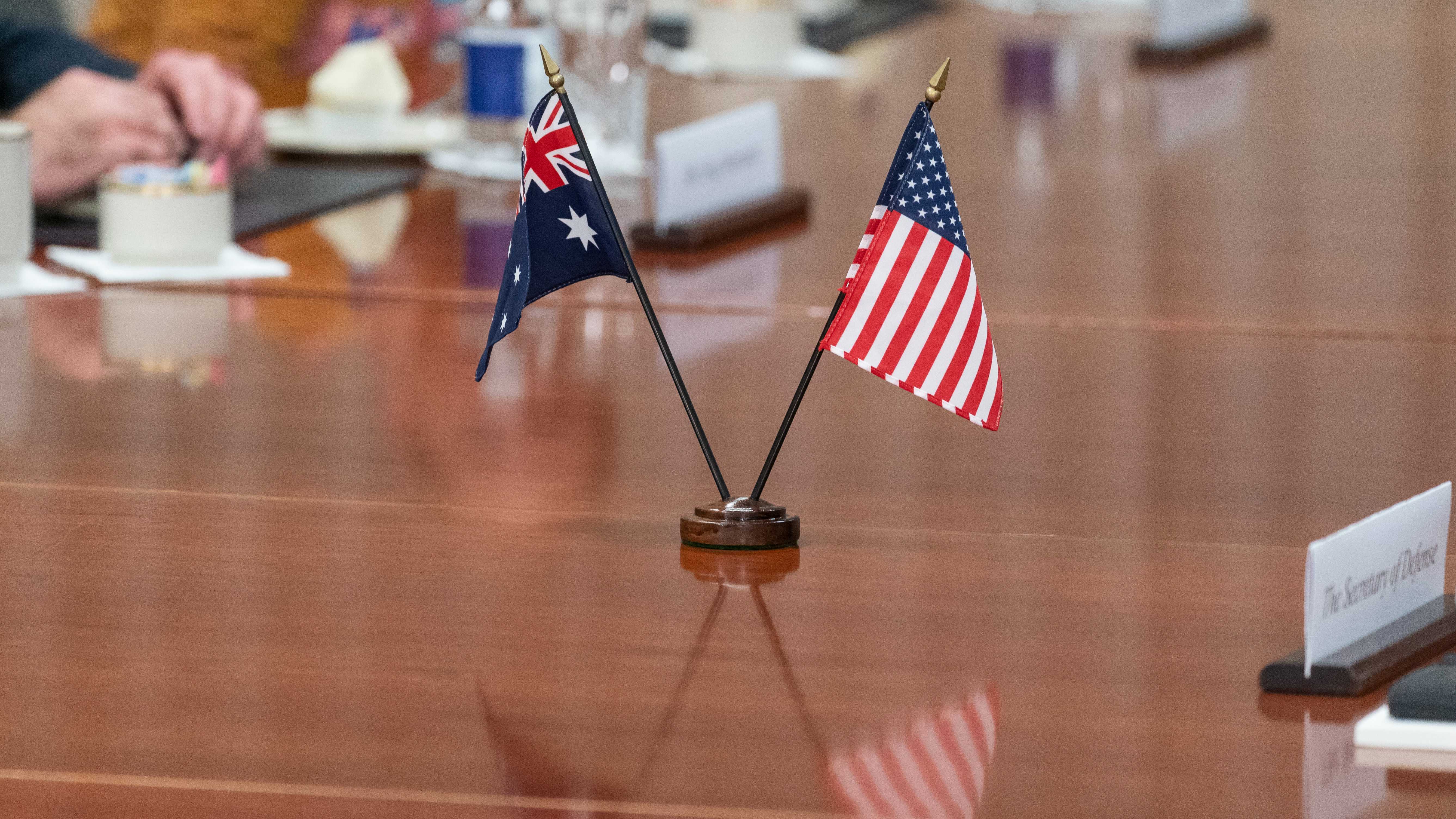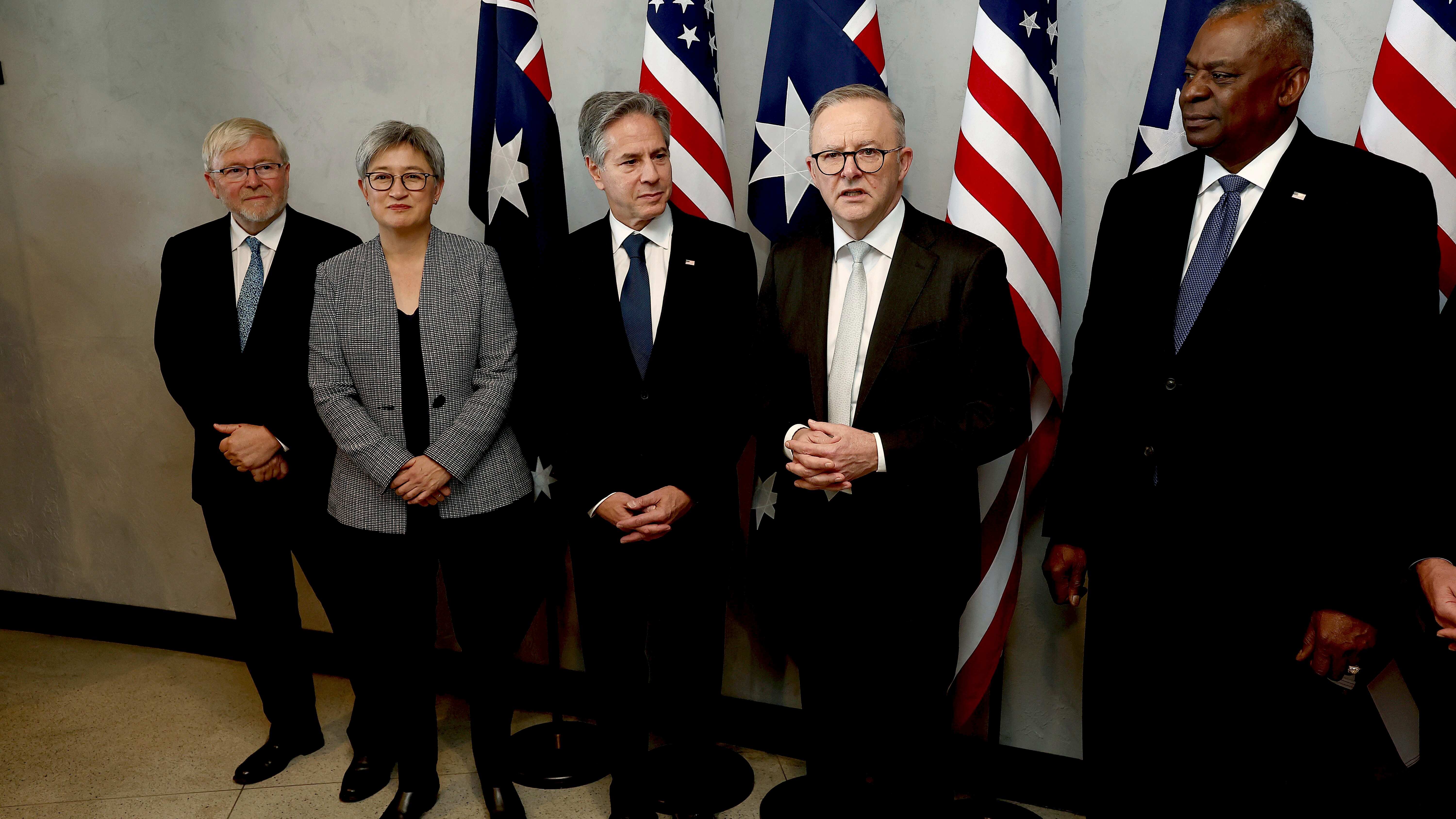
The Australian and American flags are displayed on the table at the Pentagon in Washington, U.S., July 13, 2022. /AP
The Australian and American flags are displayed on the table at the Pentagon in Washington, U.S., July 13, 2022. /AP
Editor's note: Hamzah Rifaat Hussain, a special commentator on current affairs for CGTN, is a host for ThinkTech Hawaii. The article reflects the author's opinions and not necessarily the views of CGTN.
The 33rd Australia United States Ministerial Consultations (AUSMIN) of 2023 in Brisbane, Australia, does not instill much confidence for sustainable peace, de-escalation or regional integration. Both Canberra and Washington D.C. have focused on enhancing force postures, promoting defense industrial base cooperation and increasing maritime security dominance.
These priorities clearly undermine peaceful architectures which should ideally be the bedrock of the Asia Pacific region. Yet the U.S.-Australia alliance has opted for militarization upon the premise of preserving peace, stability and prosperity. A closer examination of the fact sheet of the consultations however, reveals a concerted attempt from both sides to undermine deterrence stability in the region.
AUSMIN 2023 featured U.S. Secretary of Defense Lloyd Austin and Secretary of State Antony Blinken who met with their Australian counterparts, Deputy Prime Minister Richard Marles and Minister of Foreign Affairs and Trade, Penny Wong. Both sides affirmed the importance of their strategic alliance and building upon strategic interests.
However, instead of proposing regional de-escalation mechanisms and meaningful dialogues to diffuse tensions between states in the Asia Pacific, an ambitious range of force posturing cooperation efforts were tabled. This includes upgrading Australian bases in the north of the country – such as the Royal Australian Air Force in Darwin and Tindal, conducting regular and lengthier expeditionary visits of American submarines to Australia in 2023 and delivering a trajectory of Enhanced Force Posture Cooperation encompassing land, air and maritime domains. These measures threaten rather than reinforce regional peace.
While the joint statement issued on AUSMIN 2023 did mention the importance of enhancing regional engagement through partner priorities on climate change, good governance, respect for state sovereignty and international law, the United States and Australia advanced an array of priorities which threaten deterrence stability and state sovereignty.

Australian Prime Minister Anthony Albanese (2nd R), speaks with U.S. Secretary of State Antony Blinken (3rd L), and U.S. Defense Secretary Lloyd Austin (R), and Australian Foreign Minister Penny Wong (2nd L), prior to a lunch in Brisbane, Australia, July 28, 2023. /AP
Australian Prime Minister Anthony Albanese (2nd R), speaks with U.S. Secretary of State Antony Blinken (3rd L), and U.S. Defense Secretary Lloyd Austin (R), and Australian Foreign Minister Penny Wong (2nd L), prior to a lunch in Brisbane, Australia, July 28, 2023. /AP
This includes strengthening advanced capabilities and the health of their respective defensive industrial bases and also committing to advance cooperation on Australia's Guided Weapons and Explosive Ordnance which includes collaborations on flexible guided weapons production. There is also an agreement to help Australia build high-tech missile systems as per announcements made by Australian and American officials. Repairing, upgrading and overhauling priority munitions in Australia with a focus on MK-48 heavyweight torpedoes and SM-2 missiles were also considered. Defense Secretary Lloyd Austin went on to say that the United States would be "racing" to give Australia access to advanced munitions.
These developments clearly indicate that both sides are once again adopting a myopic approach on regional stability. There remains a fixation on containing China as the joint statement erroneously states that Beijing's actions are inconsistent with international law. Additionally, both Washington D.C. and Canberra touched on leveraging political and economic unions such as ASEAN to build capacities to manage maritime domains.
By doing so, the United States and Australia are essentially sidelining principles of neutrality and non-alignment which remain an integral part of respective foreign policies of sovereign member states. There is complete disregard for the historical will of ASEAN member states to work for common peace and prosperity in the region including the signing of the Treaty of Amity and Cooperation of 1976 and the Treaty of South East Asia Nuclear Weapon Free Zone of 1995. Any attempt at militarizing the region will be resisted.
With ASEAN espousing a historical commitment to denuclearization, the United States and Australia have welcomed progress on the AUKUS partnership, which is aimed at Australia's acquisition of nuclear submarines. Since its inception, AUKUS has remained controversial as it degrades the nuclear non-proliferation regime. The decision to provide a country such as Australia with nuclear weapons is also contentious given that the country has historically championed the cause of disarmament and denuclearization.
As per the Australian Ministry of Foreign Affairs, the Non-Proliferation Treaty (NPT) of 1968 remains central to Australia's endeavor to realizing a world without nuclear weapons. Understandings reached at AUSMIN 2023 however, are to the contrary.
It is clear that proposals from AUSMIN 2023 on regional integration are based on zero-sum approaches. Key priorities on advancing mutual alliances, partnerships, trilateral and multilateral arrangements include enhancing a trilateral integrated air and missile defense system with Japan. There is also an intent to develop comprehensive proposals for Tokyo to participate in exercises and training related activities in Australia, including F-35 Lockheed Martin Lightning II cooperation on a trilateral basis.
None of these measures enhance regional integration and there is a glaring absence of talk centered on boosting regional connectivity, infrastructural development, building economic resilience and the development of corridors. The absence of a people-centric approach speaks volumes of AUSMIN being a provocative meeting with a penchant for militarization.
The 33rd AUSMIN and the understandings reached between Australia and the United States on enhanced militarization are, therefore, problematic for sustainable peace and long-term stability.
(If you want to contribute and have specific expertise, please contact us at opinions@cgtn.com. Follow @thouse_opinions on Twitter to discover the latest commentaries in the CGTN Opinion Section.)